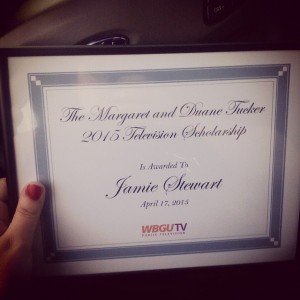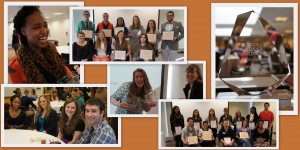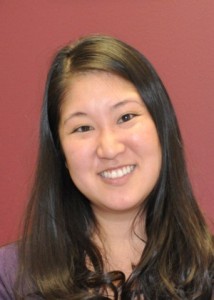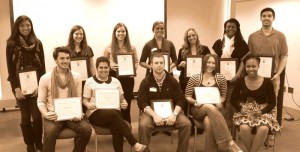Jamie Stewart, a TCOM Undergraduate student and a production assistant at WBGU-TV, was awarded the Margaret and Duane Tucker 2015 Television Scholarship. Congratulations on her scholarship award!
Dr. Sung-Yeon Park earns Faculty Senate Distinguished Service Award
Dr. Sung-Yeon Park, an associate professor and graduate coordinator in the School of Media and Communication (SMC) at Bowling Green State University, has distinguished herself as a focused, dedicated professional who demonstrates the utmost integrity in everything she does. Her efforts have earned her thefjkjkj Faculty Senate Distinguished Service Award, presented as part of the BGSU Faculty Excellence ceremony Tuesday (April 14).
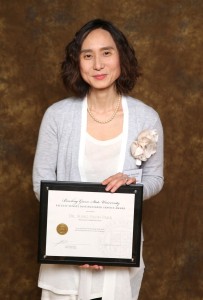 The award highlights the importance of the service of a dedicated faculty to the development and enhancement of the University. In his letter of nomination, Dr. Thomas Mascaro, a professor of telecommunications, called Park “a highly valued colleague, a credit to our university and a credit to the entire field of Academe.”
The award highlights the importance of the service of a dedicated faculty to the development and enhancement of the University. In his letter of nomination, Dr. Thomas Mascaro, a professor of telecommunications, called Park “a highly valued colleague, a credit to our university and a credit to the entire field of Academe.”
As graduate program coordinator, she took a leadership role when the program was being evaluated, amassing data to highlight the virtues of the program and compare them to peer institutions. She also has helped improve the graduate program admissions process, established curricular standards and upgraded the program’s website, with a keen eye on attracting more students to the program.
She has “distinguished herself and our university by her international and innovative outreach to new populations of prospective students,” Mascaro added. Park collaborated on a program to accept Peace Corps volunteers and established exchange programs with colleges in China and Korea. She also has led efforts to implement certificate programs for online social media.
Since joining the faculty in 2003, Park has taken on numerous service initiatives while maintaining a high level of productivity in teaching and research. She has been very involved in department and school committees, and currently serves as an adviser to the Korean Club and as a member of the Graduate Council. She has been a judge for the Shanklin Graduate Research Award, a Faculty Senator and supervisor for a WBGU-PBS survey and digital TV conversion readiness of northwest Ohio resident survey.
She earned the Granite Tower Teaching Award from Korea University, has had the top paper at four conferences and won the Department of Telecommunications’ Chair’s Service Award. She has 23 peer-reviewed journal articles and 38 refereed papers, and has served as an editorial review board member for Communication Research and Studies of Broadcasting Culture.
“Apart from her extraordinary work as grad coordinator, Sung-Yeon Park is a stellar citizen of the SMC and BGSU,” Mascaro said. “She is an affiliate faculty member in Asian studies and women’s studies and is a worthy mentor to students interested in important subjects such as body image, minority representation and the educational messages embedded in our mediated culture.”
School of Media and Communication and the Department of Communication Scholarship and Awards Ceremony
Each spring, scholarships and awards are earned by communication students, recognizing dedication and excellence within the field. Many of these awards are made available through the generosity of our alumni and gifts to foundation accounts.
This year’s scholarship and awards banquet will be held on Friday, March 27, 2015. The ceremony will begin with a school-wide reception at 3:30pm in 228 BTSU followed by the graduate student award ceremony from 4:00-4:30pm. At about 4:30pm we will meet in 201 BTSU for the Department of Communication award ceremony.
Please come to support and celebrate our outstanding students.
Dr. Lisa Hanasono is to Receive Outstanding New Teacher Award
Please help us congratulate Dr. Lisa Hanasono for winning this year’s Central States Communication Association (CSCA) Outstanding New Teacher Award. The committee selected Dr. Hanasono after carefully considering many qualified candidates for this award. The awards committee was impressed with Dr. Hanasono’s record of teaching. They said “It’s clear your students are lucky to have you!”
Dr. Lisa Hanasono will be officially recognized at the Awards Luncheon at this year’s CSCA conference.
We are very fortunate to have Dr. Lisa Hanasono here at BGSU
Ha’s lecture series in University of Nebraska-Omaha featured in School of Communication Studies Newsletter
Telecommunications Professor Louisa Ha visited University of Nebraska-Omaha as its University of Committee Advancement for Teaching speaker on Online Teaching and gave a series of lectures with graduate students and faculty of the School of Communication Studies. Details are featured in its newsletter
ttps://unoschoolofcommunication.wordpress.com/2015/03/17/school-of-communication-news-march-2015/
In addition, she was also invited to talk about her research on US audiences’ responses to digital TV multicasting and how to get involved in Journalism and Mass Communication Quarterly in the research and creative activity colloquium in the University of Nebraska-Lincoln:
https://twitter.com/fhachtmann
SMC Faculty and Graduate Students have Research Accepted in Top Journal
Communication professors Dr. Magsamen-Conrad and Dr. Dowd, and graduate students Shrinkhala Upadhyaya and Claire Youngnyo Joa, have their research paper, Bridging the Divide: Using UTAUT to predict multigenerational tablet adoption practices, accepted in the refereed journal Computers in Human Behavior (impact factor 2.273; 5-year impact factor 3.047).
Their paper examined the “Unified Theory of Acceptance and Use of Technology” (UTAUT) in the context of tablet devices across multiple generations. They tested the four UTAUT determinants, performance expectancy, effort expectancy, social influence, and facilitating conditions, to determine their contributions for predicting behavioral intention to use tablets with age, gender, and user experience as moderators. 899 respondents aged 19-99 completed the survey. They found consistent generational differences in UTAUT determinants, most frequently between the oldest and youngest generations. Effort expectancy and facilitating conditions were the only determinants that positively predicted tablet use intentions after controlling for age, gender, and tablet use. They also discuss the implications of ageism and gender discrimination of technology adoption. Finally, they argue that their findings can be extended to create effective training programs for the teaching, learning, and adoption of new technologies in a variety of organizational settings. Keywords: UTAUT, technology, adoption, age, training, gender
Full text is available here: http://scholarworks.bgsu.edu/smc_pub/37/
Magsamen-Conrad, K., Upadhyaya, S., Youngnyo Joa, C., & Dowd, J. (in press). Bridging the Divide: Using UTAUT to predict multigenerational tablet adoption practices. Computers in Human Behavior.
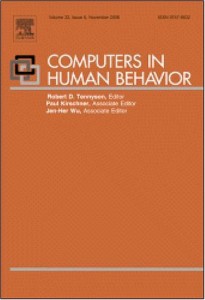
Bob Kline to receive the 2015 President’s Award for Academic Advising
Bob Kline was selected to receive the 2015 President’s Award for Academic Advising! This highly competitive and prestigious award recognizes individuals and units that make significant contributions to support undergraduate students’ educational development and academic success.
From his full time academic advising duties to his extra recruitment and outreach activities, Bob always goes above and beyond to help our students succeed. Please congratulate Bob for receiving this very important honor.
Communication Undergrads Schonhardt, Stinson, Taylor, and Wilson to Present Research at OAGE Conference
Congratulations to undergraduate communication majors Casey Schonhardt, Brandon Stinson, Terry Taylor, and Ladonne Wilson will present their research at the Ohio Association of Gerontology and Education conference this April. Please continue reading for more information of their research projects, completed during independent studys/internship under the direction of Dr. MC.
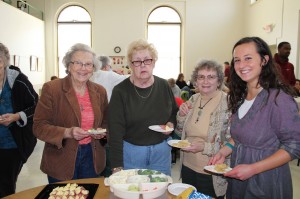
Older Adults and technology: Adoption and acceptance comes from relationships and encouragement from younger generations
Paper to be presented by Casey Schonhardt
Abstract:
As technology progresses, older generations are being given ‘smart’ devices and are adopting these devices to keep up with daily life. Stereotypes posit that the different generational groups perspectives on each other and the digital divide prohibit older generations from adopting new technologies. At the Wood Country Center on Aging located in Bowling Green Ohio, the small group communication class of Bowling Green State University teaches tablet classes once a week to interested older adults. Classes were observed using the STAM (Senior Technology and Acceptance Model), specifically the acceptance phase, over six weeks with narrative and phenomenological research methods. Observing and assisting four small groups teaching older adults different categories of smart tablets, conclusions were made on why older adults accept the technology and even come back for further classes. At the end of the project, it was found that the more positive and genuinely encouraging the students were, the more the older adults consistently attended classes and engaged in learning. Despite rumors of barriers of an age and digital divide, social cues, the relationships made, and the environment play a part in the motivation of technological diffusion in older adult’s daily life.
Introducing and Teaching Information Communication Technology to Senior Citizens
Poster to be presented by Brandon Stinson
Abstract:
This poster examines older adults’ acceptance of information communication technologies (ICTs) as well as strategies for educating older adults about how to use ICTs. Information communication technology has become a key component in our society (Hernandez-Encuentra). For the majority of people it has become a pillar of their everyday lives (Trentin). Today however, many older adults are still reluctant to learn and integrate most information communication technology into their own lives (Gonzalez) as they have for years whenever new technology comes along. Research has shown that several different factors exist to explain why senior citizens do not welcome information communication technology (Loges). Even if they can be convinced to use this technology there are still several factors that can prevent them from both properly and efficiently using it. Researchers have shown that there are numerous methods to teach senior citizens how to properly use information communication technology with varying degrees of success (Jones). This poster will summarize what I have discovered through both compiling information as well as my personal observation with teaching seniors through Dr. Magsamen-Conrad’s Small Group Communication class and an internship at the Wood County Committee on Aging. During Dr. Magsamen-Conrad’s class in the Spring 2014 semester, small groups of five students spent six weeks in a classroom setting teaching older adults how to use tablets. This was the same idea at the internship. From July to August 2014 I taught roughly fifteen older adults how to use tablets in a mostly one on one setting. As older adults continue to become an increasingly larger portion of our population (Lam) it is becoming morevital than ever that they learn and accept information communication technology and become integrated with the rest of society (Feist).
RED: Retired, Engaged, and Determined
Poster to be presented by Terry Taylor
Abstract:
My name is Terry Taylor. I am a senior at Bowling Green State University majoring in Communications with a minor in Geography. Iplan to submit a full paper to be considered for a student award and my professor’s name is Dr. Kate Magsamen-Conrad. I worked very close with Dr.MC through a communications class at the senior center that focused on small group communication. I look into the service that we provided through a series tablet classes held at Bowling Green’s senior center and explore the idea and possibility of expanding the market or services to this age demographic. With the age of retires about to reach and all time high due to the Baby Boomers and the fact that technology is changing and advancing every year, I feel that it is vital to provide similar services as we did in our tablet classes held through the senior center on a wider scale. I conclude with reasoning on why this increased knowledge and interaction through technology is imperative for older adults. My objective is to show a need for the increase in understanding of technology for older adults on a broad scale and to make it aware that this is very beneficial to them in physical, mental, social, and various other forms.
Older Adults Attitudes towards New Communication Technologies
Poster to be presented by Ladonne Wilson
Abstract: As the amount of New Communication Technologies (NCTs) being created increases at an exponential rate it is important to better understand how all portions of our population take advantage of newer NCTs, including older adults. This study sought to better understand older adult’s attitudes towards NCTs as a means of learning and adaption as well as maintaining independence. The researchers argued that older adult’s attitudes toward NCTs have an effect on older adult’s perceived and therefore actual usability. This study was conducted by a communication research methods course at an Ohio public university and it included surveys and interviews of 525 older adults living in the Midwestern United States. The researchers divided the participants into four age groups, Builders, Boomers, Generation Xers and Millennials, and focused primarily on web literacy, performance expectancy, and effort expectancy. The researchers found that there were significant generational differences in attitudes towards NCTs and younger generations were more likely to positively respond to newer NCTs than older generations. The researchers also found that older adults do not experience an immediate attraction to NCT’s unlike younger generations. The researchers posit that these results indicate that must be a greater focus on reducing the deficit between younger and older generations and their respective levels of NCT literacy.
Ha to speak at both University of Nebraska-Omaha and University of Nebraska-Lincoln
School of Media and Communication professor Louisa Ha will speak to the faculty and staff of the University of Nebraska-Omaha on Do’s and Don’ts in online teaching on March 12 as a university invited speaker for instructional development.
This is part of her Nebraska trip during spring break in which she will also speak to graduate students and faculty in the University of Nebraska-Omaha (UNO) about her research in social and mobile media and her career and editorship in Journalism and Mass Communication Quarterly. The organizer of the Omaha trip is Dr. Joy Chao, SMC alum and assistant professor in School of Communication of UNO.
In addition, Ha will also speak at a research colloquium of the University of Nebraska-Lincoln on March 13 on her research on US digital broadcast subchannel viewing: A comparison of Commercial and Public Broadcast Channels.
Communication Scholarships and Awards Deadline February 16, 2015
Each spring, scholarships and awards are earned by Communication students, recognizing dedication and excellence within the field. Many of these awards are made available through the generosity of our alumni and gifts to foundation accounts.
The deadline for this year’s scholarship and award applications is February, 16, 2015. Applicants must have one or more remaining semesters (summer or fall 2015) at BGSU to qualify for scholarship awards. Students now classified as first year students (freshmen) are encouraged to include their high school achievements where appropriate. Attendance at awards reception on March, 27, 2015 is expected. Application materials can be downloaded here http://www.bgsu.edu/arts-and-sciences/media-and-communication/communication/scholarships-and-awards.html
Submit hard copies of all materials described in the packet to School of Media & Communication office in 302 West Hall, by 5:00 p.m., Monday, February, 16, 2015.


